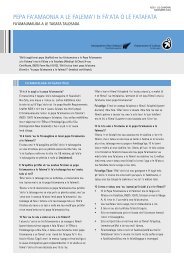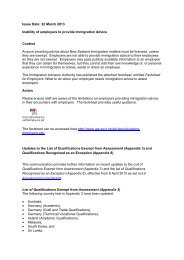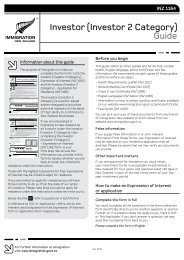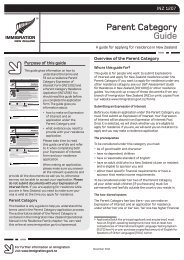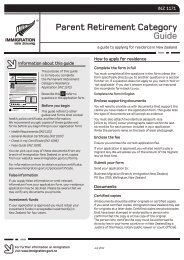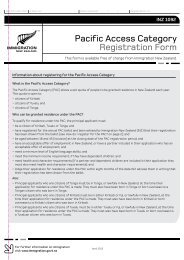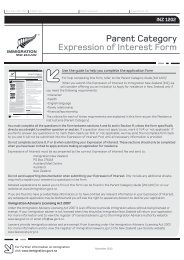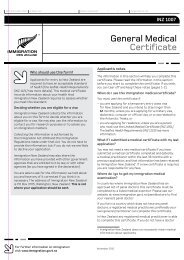Handbook for Medical Examiners - Immigration New Zealand
Handbook for Medical Examiners - Immigration New Zealand
Handbook for Medical Examiners - Immigration New Zealand
You also want an ePaper? Increase the reach of your titles
YUMPU automatically turns print PDFs into web optimized ePapers that Google loves.
D10 cardiovascular system<br />
Assessment includes:<br />
• cyanosis, pallor, peripheral temperature and oedema<br />
• size and consistency of thyroid gland, including any masses<br />
• pulse rate and rhythm<br />
• blood pressure<br />
• jugular venous pressure<br />
• palpation <strong>for</strong> thrills and character of apex beat<br />
• auscultation of heart sounds, extra sounds and murmurs<br />
• peripheral vascular system: carotid, radial, femoral, posterior tibial and dorsalis pedis, and<br />
• carotid and femoral bruits, and<br />
• ECG if any abnormalities found on history or examination.<br />
All abnormalities must be noted on the medical certificate.<br />
Blood pressure must be measured in all applicants over 15 years using an appropriate cuff size.<br />
If the blood pressure is elevated, repeat after the patient has rested <strong>for</strong> five minutes and, if<br />
necessary, again after 10 minutes.<br />
Applicants with heart murmurs or evidence of heart valve disease or cardiomegaly require an<br />
echocardiogram.<br />
Referral to an appropriate physician is necessary <strong>for</strong>:<br />
• five-year cardiovascular disease (fatal and non-fatal) risk level over 20 per cent using<br />
<strong>New</strong> <strong>Zealand</strong> cardiovascular risk charts www.nzssd.org.nz/cvd<br />
• previous cardiovascular event such as angina, myocardial infarction, percutaneous coronary<br />
intervention, coronary artery bypass graft, severe peripheral vascular disease, diabetes with<br />
nephropathy (albumin: creatinine ratio >30mg/mmol or urinary albumin >200mg/L)<br />
• persistent uncontrolled hypertension<br />
• cardiomyopathy<br />
• aortic aneurysm<br />
• unstable, progressive, symptomatic or complicated conditions, or<br />
• any condition likely to significantly affect the applicant’s ability to function at home, study or<br />
work or per<strong>for</strong>m activities of daily living.<br />
A recent report less than six months old is acceptable.<br />
All reports must be attached to the medical certificate.<br />
D11 Respiratory system<br />
Assessment includes:<br />
• respiratory rate<br />
• any respiratory distress, cyanosis and accessory muscle use<br />
• position of trachea<br />
• cervical lymphadenopathy<br />
• chest shape and expansion<br />
• percussion of the chest<br />
• auscultation of breath sounds<br />
• finger clubbing<br />
• peak expiratory flow rate, and<br />
• good quality spirometry if possible.<br />
All abnormalities must be noted on the medical certificate. For applicants with 20 pack year or<br />
more smoking history, note the peak expiratory flow rate on the application <strong>for</strong>m. If possible,<br />
also arrange spirometry and attach results to the application <strong>for</strong>m.<br />
20 – <strong>Handbook</strong> <strong>for</strong> <strong>Medical</strong> <strong>Examiners</strong> - September 2012


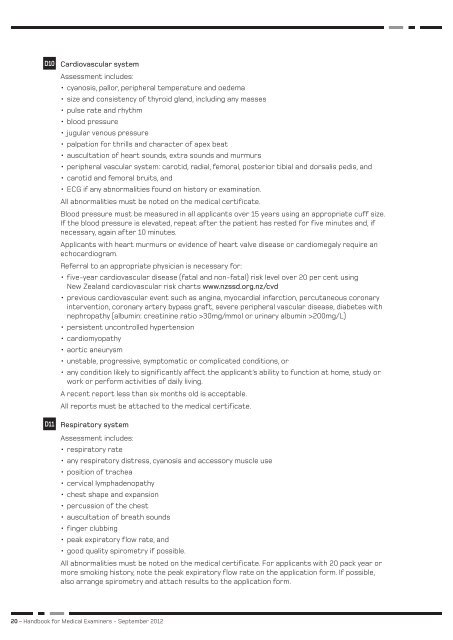
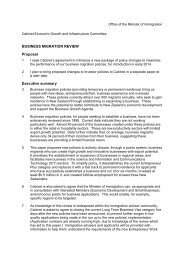
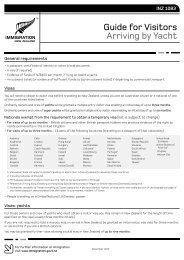
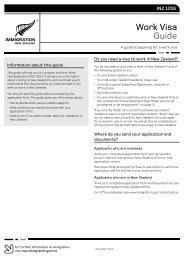
![Long Term Skill Shortage List PDF [200KB] - Immigration New Zealand](https://img.yumpu.com/15876707/1/184x260/long-term-skill-shortage-list-pdf-200kb-immigration-new-zealand.jpg?quality=85)
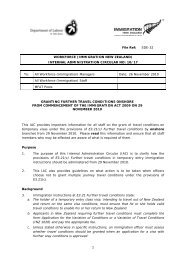
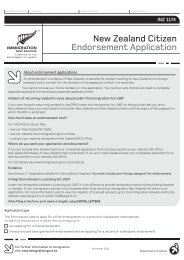
![New Zealand Residence Programme Fact Sheet PDF [161KB]](https://img.yumpu.com/14040475/1/184x260/new-zealand-residence-programme-fact-sheet-pdf-161kb.jpg?quality=85)
